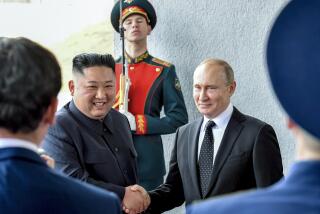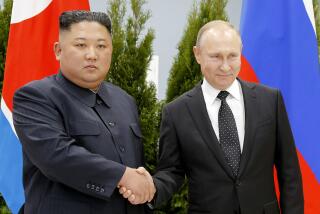N. Korea to allow nuclear inspection
- Share via
SYDNEY, AUSTRALIA — North Korea will open its Yongbyon nuclear facility to U.S., Russian and Chinese nuclear experts next week as diplomatic efforts to shutter the North’s nuclear program enter a new phase, U.S. diplomats announced Friday.
The announcement by Assistant Secretary of State Christopher Hill, the chief U.S. negotiator on North Korea, capped a day of diplomacy that began with an awkward exchange between President Bush and South Korean President Roh Moo-hyun over relations between the two Koreas.
Hill said the North Koreans, who shut down Yongbyon this year, suggested the site visits as part of the next stage of disabling the facility’s reactors. The first visit is to take place from Tuesday until the following Saturday and is to include nuclear experts from the three other nuclear members of the six-party talks on the North Korean weapons program.
“Our plan is to get this done by Dec. 31. To do that, we need to have some nuclear experts get some eyes on, and we thought the sooner the better,” Hill said.
North Korea’s nuclear advances, including its test last year of a nuclear device, have been the predominant obstacle in U.S.-North Korean relations. And when Bush linked the nuclear issue with prospects of a treaty officially ending the Korean War, Roh pressed him to clarify his position.
Although hostilities ceased in 1953, a peace treaty has not been signed, and North Korea cites the fear of renewed conflict as a reason it has pursued nuclear weapons.
“It’s up to [North Korean dictator] Kim Jong Il as to whether or not we’re able to sign a peace treaty to end the Korean War,” Bush said. “He’s got to get rid of his weapons in a verifiable fashion. And we’re making progress toward that goal. It’s up to him.”
But Roh persisted. “If you could be a little bit clearer in your message. . . . “
“I can’t make it any more clear, Mr. President,” Bush replied in a tone some perceived as testy. “We look forward to the day when we can end the Korean War. That will end -- will happen when Kim Jong Il verifiably gets rid of his weapons programs and his weapons.”
Afterward, aides suggested that there may have been a problem with the interpreter’s translation and that Roh may not have understood what Bush said the first time.
Others speculated that Roh may have been pushing for a more unequivocal statement.
White House officials insisted that there was no sign of tension during the two leaders’ private meeting. Incoming White House Press Secretary Dana Perino suggested that reporters were “trying to make a little bit too much of it.”
“The president made a clear statement of his support for ending the Korean War once and for all. And both leaders agreed on that,” Perino said. “And there was no tension in the meeting. There was no tension after the meeting amongst staff or amongst the leaders.”
In other developments at the Asia-Pacific Economic Cooperation gathering in Sydney, Bush invited members of the Assn. of Southeast Asian Nations, or ASEAN, to a summit in Texas in upcoming months. It would be to mark the 30th anniversary of U.S. ties with the group and would seek to compensate for Bush’s cancellation of ceremonies originally scheduled this year for Singapore.
Bush and Russian President Vladimir V. Putin also agreed that a U.S. military delegation would visit Russia’s Gabala radar system in Azerbaijan this month.
Putin has offered the United States access to Gabala if Washington gives up a plan to install missile-defense facilities in Eastern Europe. Bush has said he is willing to incorporate Gabala into his plans but has said he is not willing to halt the missile-defense plan.
More to Read
Sign up for Essential California
The most important California stories and recommendations in your inbox every morning.
You may occasionally receive promotional content from the Los Angeles Times.













